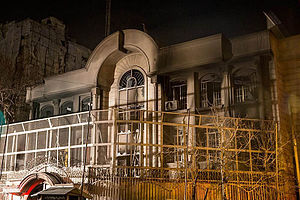2016 attack on the Saudi diplomatic missions in Iran
| 2016 attack on the Saudi diplomatic missions in Iran | |||
|---|---|---|---|
| Part of Iran-Saudi Arabia proxy conflict | |||

The Saudi embassy in Tehran after the attack
|
|||
| Date | 2–3 January 2016 | ||
| Location |
Kashanak, Tehran, Iran (embassy) Sajjad Shahr, Mashhad, Iran (consulate) 35°48′05″N 51°28′32″E / 35.80139°N 51.47556°E (Tehran) 36°19′07″N 59°32′56″E / 36.31861°N 59.54889°E (Mashhad) |
||
| Causes | Protests against the government of Saudi Arabia and the House of Saud over the execution of Sheikh Nimr al-Nimr. | ||
| Methods | Demonstrations and rioting | ||
| Result |
Embassy in Tehran arsoned and destroyed
|
||
| Parties to the civil conflict | |||
|
|||
| Lead figures | |||
|
|||
| Number | |||
|
|||
| Casualties | |||
| Arrested | ~100 protesters (as of 24 January 2016) | ||
Embassy in Tehran arsoned and destroyed
Official positions
Judicial Power:
Ministry of Interior:
"An organized group which has been active in Karaj and Tehran for more than 10 years"
Alleged:
The 2016 attack on the Saudi diplomatic missions in Iran was a mob action on 2 January 2016 by a crowd of protesters who stormed the embassy in Tehran and another Saudi diplomatic consulate in Mashhad, ransacking offices. The embassy building was set on fire with Molotov cocktails and petrol bombs. During the attacks, the police arrived and dispersed protesters from the embassy premises and extinguished the fire.
The attacks were later condemned by Supreme Leader of Iran Ali Khamenei, and Iranian president Hassan Rouhani. On 24 January, Gholam-Hossein Mohseni-Eje'i announced that around 100 people involved in the attack are in custody by the authorities.
Before the attacks began and after the execution of Sheikh Nimr, the Iranian Foreign Ministry summoned the Saudi Arabian chargé d'affaires hours after al-Nimr's execution. Foreign Ministry Spokesman Hossein Jaberi Ansari said the execution of Sheikh Nimr "who had no means other than speech to pursue his political and religious objectives only shows the depth of imprudence and irresponsibility". He said that the Saudi government "supports terrorist movements and extremists, but confronts domestic critics with oppression and execution".
...
Wikipedia
